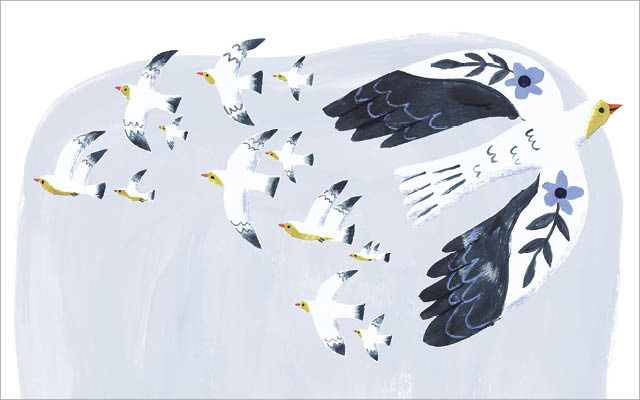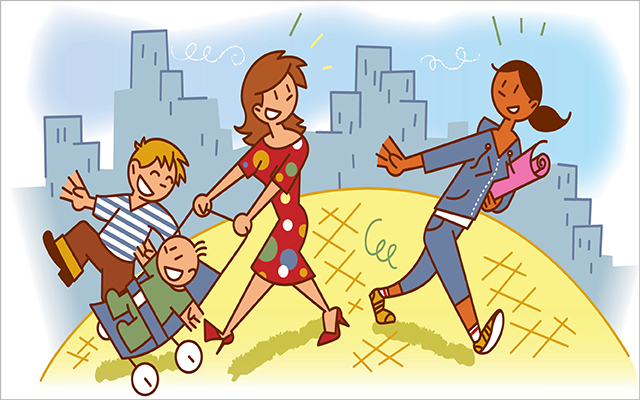During season 4 of Netflix’s hugely popular Queer Eye, cast member Jonathan Van Ness returns to his hometown of Quincy, Ill., to make over his former high school music teacher, Kathi Dooley. On the drive there, Van Ness and the other four cast members learn that Dooley and her husband “never had a child, but they consider their students family” — information that prompts some “awws” from the Fab Five.
As viewers get to know Dooley, they learn just how beloved she is by the entire school district and how many kids’ lives she’s changed, including Van Ness’s. She has profoundly affected generations of children in Quincy, as well as their families. And she has been able to do so because of her ability to focus so intently on her work: Like most public-school teachers, Dooley begins her days early, and her husband says that most nights she’s lucky to make it home before the 10 o’clock news.
Sociologist Amy Blackstone, PhD, author of Childfree by Choice: The Movement Redefining Family and Creating a New Age of Independence, found in her research that a quarter of the childfree women and men she interviewed “actually chose careers that require them to be involved in children’s lives, and they chose them because they wanted to make a positive difference for children.”
Perhaps Dooley could have made the same impact in Quincy if she’d been a parent. But maybe not. Maybe she’d have spent the energy she’s been able to dedicate to a whole school district on her own kids, and her larger community would have missed out on her expertise and attention.
Regardless of their many societal contributions, childfree people are commonly viewed as somehow selfish, incomplete, or simply less psychologically fulfilled than parents. And since most people (especially women) are raised to think of themselves as someday having a family, it’s fair to say it’s the cultural expectation and the statistical norm — even as the U.S. birth rate declines to record lows. One 2017 study found that many participants considered the decision not to raise children not only unusual but morally outrageous.
Ultimately, Dooley’s Queer Eye makeover wasn’t about why she didn’t have kids, and, of course, it’s no one’s business but hers and her husband’s. Many couples aren’t necessarily childfree by choice so much as by circumstance. But for those for whom it is a conscious choice, there are many valid and fulfilling ways to live a life that doesn’t include parenthood.
Understanding that there are numerous reasons people choose to remain childfree can go a long way toward easing the stigma as well as promoting more open communication between people with varying views on parenthood. With that in mind, consider these three things that many childfree people want others to know.
1. They don’t dislike children or resent people with kids.
Blackstone’s research has shown that, like Kathi Dooley, many childfree people pursue careers — including teaching, pediatrics, and social work — that involve kids.
“And even those who don’t have careers that center on children talk about the relationships they have with kids in their lives. They’re close with their nieces and nephews or they take care of their friends’ kids when their friends need help,” Blackstone explains. “There are all kinds of ways to experience closeness, connection, and love with children that don’t include being a parent.”
Meghan Daum, editor of the anthology Selfish, Shallow, and Self-Absorbed: Sixteen Writers on the Decision Not to Have Kids, would like people to abandon the idea that parents and nonparents are adversaries — a mindset that’s all too easy to adopt if your main focus is justifying your own life choices. “Choosing not to have kids is not disrespecting parents,” she says. “It’s quite the opposite. I don’t see how you could be more respectful to parents than to acknowledge that parenthood is a really important and difficult thing. It should only be done by people who really want to do it.”
2. Their reasons are varied.
Some people choose not to raise children because they fear passing on damaging genetic conditions; others, like members of the Facebook group Birth Strike, argue that a childfree household fights climate change by limiting its carbon footprint.
A 2018 New York Times poll cited financial reasons at the top of the list, including concerns about the cost of childcare. Desiring personal freedom also factors into the decision, as well as prioritizing career, other relationships, and other life experiences over parenting.
It’s also OK to simply not want to raise kids. Daum’s anthology partly emerged from her frustration with the way the issue was being framed culturally. “In interviews, people who had chosen not to have kids would say things like ‘I forgot to have kids’ or ‘I’m too selfish to have kids’ or ‘I’d rather take expensive vacations.’”
Not becoming a parent was viewed as such extreme behavior that “it was almost better to say that you were shallow and materialistic than to tell the truth, which would be something like ‘This just isn’t for me.’”
To promote more honest and thoughtful dialogue about this issue, Daum suggests, childfree people could try to be more forthcoming in their conversations. “There’s nothing wrong with just saying that you didn’t want to have kids,” she explains. “You don’t have to make excuses.”
3. Most don’t make their decision lightly.
With some exceptions, of course, most childfree people have carefully considered their options and come to the choice intentionally, sometimes having to rethink the ways they were raised and reassess expectations from their communities. This occurs particularly in the case of people raised in religious homes.
Amy Blackstone’s husband, Lance, who wrote the afterword to her book, grew up in a fundamentalist Christian family in the South. “Growing up, in my head it was definitely never a question that you were going to have kids,” he explains. He and Amy decided together that they didn’t want children.
Over the 25 years of their marriage, he’s received some interesting responses to his childfree decision. “Some people say, ‘You know, if I had to do it over, I don’t know if I’d have kids,’ or, ‘I love my kids, but I could see doing that, too.’”
Another aspect of a childfree choice that’s often not discussed: It opens up a world of possibility for others in subtle but important ways. Daum grew up in a suburb where she knew nobody over the age of 40 who wasn’t raising a family. “I didn’t have any models for any other way to live your life as an adult,” she says. “And it’s important for kids to see that there are all different kinds of ways to be an adult. There are lots of ways to live your life.”




This Post Has 0 Comments